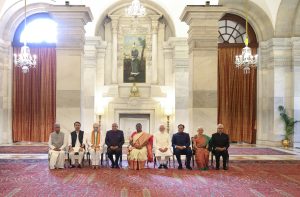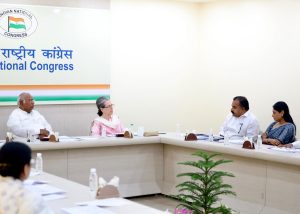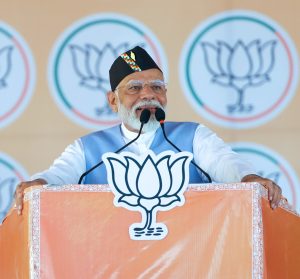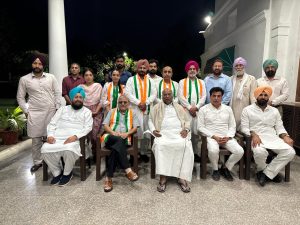Military cannot be subjected to FIR for its operations: Indian Army
Military cannot be subjected to FIR for its operations: Indian Army
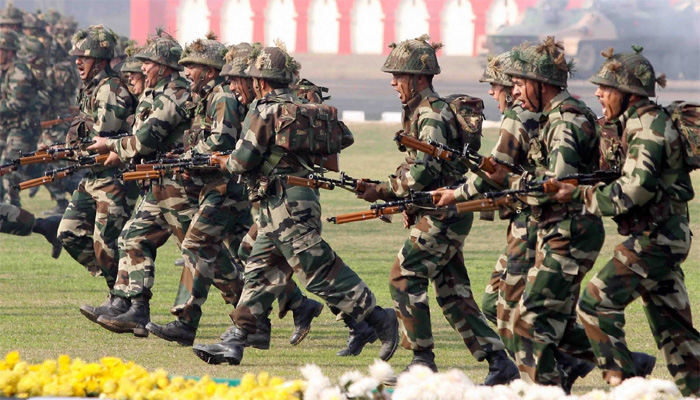
NEW DELHI (INDIA): Operations against militants or insurgents may be affected if FIRs are lodged against the Indian Army, the Supreme Court of India was told today.nnThe Army also told the apex court that it cannot be subjected to FIRs for carrying out anti-militancy operations in insurgency-prone areas like Jammur and Kashmir and Manipur, while alleging local bias in the judicial inquiries conducted against it in these regions, which have tarnished its image.nn”Judicial inquiries which are biased due to local considerations have tarnished the image of Army. Military operations cannot be dissected in a particular way. Army cannot be subjected to FIR otherwise military operations cannot be carried out,” Attorney General Mukul Rohatgi told a bench of Justices M B Lokur and U U Lalit.nnRohatgi, appearing for the Army and the Assam Rifles, said it cannot be subjected to investigation by the state police with regard to its operations against militants in strife-torn areas.nn”Whether it’s Jammu and Kashmir or Manipur, we are facing the same local bias. Why doesn’t any judicial inquiry ever exonerate the Army? These inquiries (have) never said that Army did the correct thing. Army is facing problems due to bias in such inquiries,” he said.nnPointing out that Army was working in very difficult situations in these areas, Rohatgi said it has its own system in place, has its own approach and is governed by different set of rules.nn”In every military operation, Army cannot be disbelieved.nnEvery judicial inquiry cannot be against the Army. The alleged extra-judicial killing cases in Manipur are not cases of massacre, rather these are cases of military operations,” he said.nnHe said the petitions under Article 32 of Associations of Widows from Manipur, seeking FIR into alleged extra- judicial killings and SIT probe, should not be considered and the court should not embark into it.nnDuring the hearing, the bench also questioned the Army over its Court of Inquiry, a fact finding proceeding.nn”Court of Inquiry is for the benefit of the Army. It is not for the satisfaction of public which has the right to know the truth behind any incident,” the bench said after Rohatgi alleged bias in the judicial probes conducted by district judges.nnThe bench also pulled up the Manipur government for not taking action on such alleged fake encounters by armed forces and asked was it “not supposed to do anything”.nnSenior advocate V Giri, appearing for Manipur, accepted the lapse on the state government’s part but said even the High Court never asked it to register FIRs in such cases.nnThe court then asked the Manipur counsel whether now the state government can register FIRs into these alleged cases of extra-judicial killings.nn”Yes, we can register FIR, if the court so directs under Article 142. There is no blockage in law with regard to lodging of FIR,” the senior advocate said.nnThe bench asked the parties including the Centre and Manipur to suggest five names each of officials, ex-officials whom they fit are suitable for Special Investigating Team (SIT) to be constituted to investigate such cases.nnThe apex court after perusing the names reserved its verdict on the point of lodging of FIR and constituting a SIT for investigation into the killing in which judicial inquiries have been conducted.nnThe court is hearing a PIL seeking probe and compensation in alleged 1,528 extra-judicial killings in Manipur from 2000 to 2012 by security forces and police.nnThe court, which has conducted hearing for three consecutive days, had earlier rapped Manipur for remaining silent over rape and murder charges against Army personnel.nnThe bench said three such cases in which the Commissions of Inquiry had given its findings, including that of Thangjam Manorama, a Manipuri woman who was allegedly killed in the custody of the Assam Rifles on July 10, 2004, after being picked up on suspicion of working for the insurgent outfit, People Liberation Army.nnThe Army had yesterday told the court that the judicial probes conducted into alleged extra-judicial killing charges were “biased” and slanted against them due to local factors.nnIt alleged that the district judges, who were locals, had conducted the judicial inquiries into the alleged killings and local factors came in the way of the probe reports which went against the armed forces.nnDuring the hearing, the court was earlier told that there were 265 cases of deaths which have to be examined and there were various reports of the commission of inquiry in which serious allegations have been levelled against armed forces personnel.nnThe apex court had earlier asked the Centre to segregate the cases related to the armed forces from the list of 265 incidents of extra-judicial killings in Manipur.nnThe Centre had said that out of the 282 cases, which were referred to it for verification, 70 matters were found to be related to the Army and Assam Rifles, while the rest concerned the state police.nnIn July last year, the apex court had directed a thorough probe into the alleged fake encounter killings in Manipur saying the use of “excessive or retaliatory force” by the armed forces or police was not permissible in ‘disturbed areas’ under the controversial Armed Force Special Powers Act.nnSource: Press Trust of India

